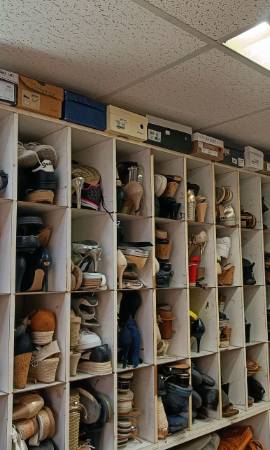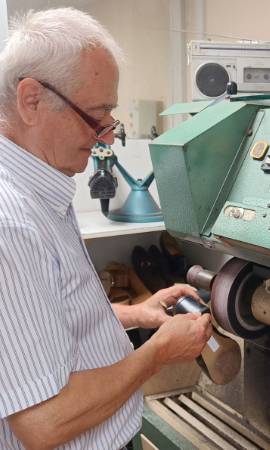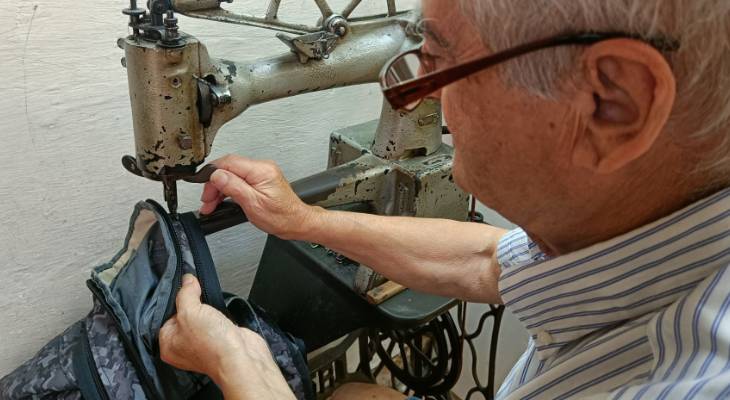It's not a nice feeling when you’re flying out the door in a rush and all of a sudden the sole of your shoe comes loose, especially if it's your most comfortable pair. Fortunately, in the business world, there are craftsmen that can resurrect shoes back to life, if possible. Unfortunately, not many still see the value of shoe repair and that is what makes Anthony Abdilla, from Abdilla’s shoe repair one of the very last cobblers on the island.
Residents from the South-east district of Malta have certainly heard Anthony’s shop, situated in Hal Ghaxaq. Like many other craftsmen on the island, Anthony’s skills stemmed from his father’s own shoe repair shop in the neighbouring town, Zejtun.
He recalled being surrounded by his father's work from the very early years of his life. Despite this, he told WhosWho.mt that he had left his job as a cobbler with his father before hitting his 20s. “I left the shop for two years. I worked in factory, I got fed up and I left. I tried working someplace else and I got fed up as well.” Ultimately, Anthony felt the need to go back to his roots, and he never looked back for the past 50+ years.

Ready, set, repair! Shoes and bags lined up ready to be collected
Walking through the shop, Anthony was surrounded by numerous shoes and handbags of different colours, ready to be repaired and collected by their owners. Sitting by his sewing machine, Anthony explained that when he opened his business, first on the agenda was for him to buy the necessary machinery. In doing so, he contacted agents and bought a sewing machine from England and a big multi-functional machine from Italy.
But machines aside, what are the most important skills for a cobbler to have? According to Anthony, the most important skill of all is simply, patience. “Especially when it comes to sewing. You need a lot of patience. Sometimes you go in thinking a bag only needs two stitches to be repaired and two turn into six. Instead of dedicating five minutes to it, you end up spending more time.”
Naturally, like any other trade, practice makes perfect, and one is inclined to become more efficient the more experience they have. “Being in this business, it is not difficult to learn the craft. Most knowledge you acquire is by time, when you see first-hand how certain things are done.”
Anthony shares that in the past, the shop's main “challenge” was having lots of work coming in, now it’s the complete opposite.
Asked about whether he notices changes in the quality of materials used in modern shoe wear, compared to when he started out the business, he nods and says that nowadays, “material is cheap, in more ways than one.”
“Before we used to go out to certain shops in Valletta and when buying shoes, we knew what quality shoes we were purchasing. We used to spend Lm40 on a pair of shoes but now with €50 euros you can buy three pairs,” Anthony says.

Buys at work - Anthony takes WhosWho.mt around his shop
Asked further how this impacts his business, he remarks that it is difficult in many ways. “If someone buys a pair of shoes from the internet costing €10 and it breaks because of cheap material, people hesitate to repair it. Before the most popular material used was leather but now most shoes are imitation and can easily get scratched, start peeling and in some instances start wearing off by themselves before the first wear,” Anthony asserts.
That is, he adds, if the shoes are even repairable. “Most of the time, upon inspection, we have to refuse customers because some shoes cannot even be brought back to life,” he explains.
He adds that other times he has to explain that certain repairs are costly. “I let the customer know that this might cost around €10 to repair. Which, obviously, if bought on the cheap side it might be more worth it for them to buy it again than fix used shoes.”
With materials being the focal point of the interview, WhosWho.mt also asks about acquiring materials. Promptly, Anthony remarks that despite the price his shop always had quality supplies to mend the shoes. “That is something I always ensured.”
However, disheartened, he explains that until four years ago agents would come knocking on his door every week asking if he needed to buy something off them or if he needed to restock certain materials. “Now I’m lucky if I get to see the agent. Since so many shops closed their doors, it is no longer beneficial for agents to go around the last men standing around Malta. With traffic around every corner and only a few shops scattered across the island, agents resorted to receiving orders via telephone. Sometimes we go pick the orders ourselves other times they deliver,” Anthony claims.

“To this day, i’m still working to pass time. What else am I going to do with my free time at home?"
‘Having courses on shoe repair would be a fantastic idea but not viable, unfortunately’
Malta’s workforce numbers in gaming, finance, technology and marketing industries have certainly soared on the islands. Despite leaving a positive mark on the economy, other important sectors on the island, including the shoe repair business, were becoming less and less attractive to the upcoming generations.
Nonetheless, Malta has increased its effort in bringing back craftsmanship and artisan work, with MCAST being one of the brains behind such attempts. However, a quick google search reveals that there are no workshops in Malta that teach shoe repairs.
On the matter, Anthony believes that it certainly would be a fantastic idea to introduce such a course, but unfortunately “it is not viable. We are slowly dying.”
Anthony mentions that one of his two sons occasionally helps him at the shop. “My other son was never really interested in shoe repair and after I stop working, he can only take over on a part-time basis.” Although, he says, reducing more hours from the opening time at the shop might drive away the customer base.
“To this day, i’m still working to pass time. What else am I going to do with my free time at home? But after my son, there’s no one else to carry the business,” Anthony says. Nonetheless, he is still happy that his son can take over after he retires.
“After all, we know families that their business closed its doors forever after the retirement of the
Main Image:
